The flight took off only at around 1.20 am on 11 December.
Caught a couple of hours of sleep... not enough to make-up for the 3-hour sleep in the past few nights.
Kyushu 九州行
10-16 December 2010
11 December: Huis Ten Bosch
Well known as the only Dutch Theme Park outside Holland! It was modelled after a mediaeval 17th century Dutch town, Palace Huis Ten Bosch. There were several landmarks - Windmills! Cloaks! and Tulips (unfortunately, there wasn't any during in winter).
The theme park was not crowded...

 A very huge pair of cloaks! Cloaks for Toa-Cah-Soh!
A very huge pair of cloaks! Cloaks for Toa-Cah-Soh!
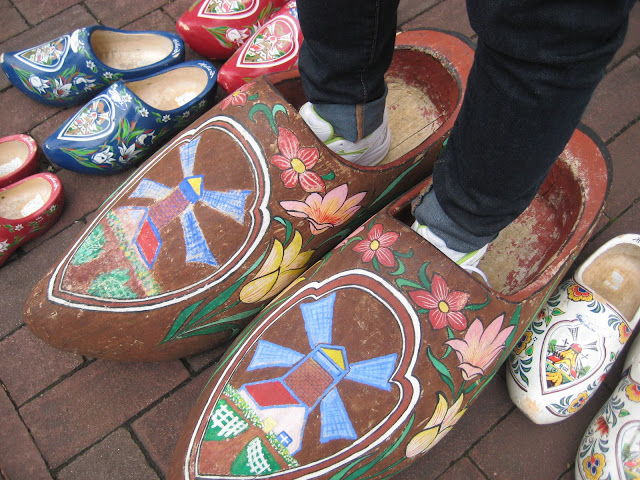
A ranger and the bear cycling around the theme park!
 Visitors could rent a bicycle to cycle around the park.
Visitors could rent a bicycle to cycle around the park.

At the entrance to the palace (park) stands the monument that commemorates the atomic bombing of Nagaskaki on 9 August 1945, 11.02 am:
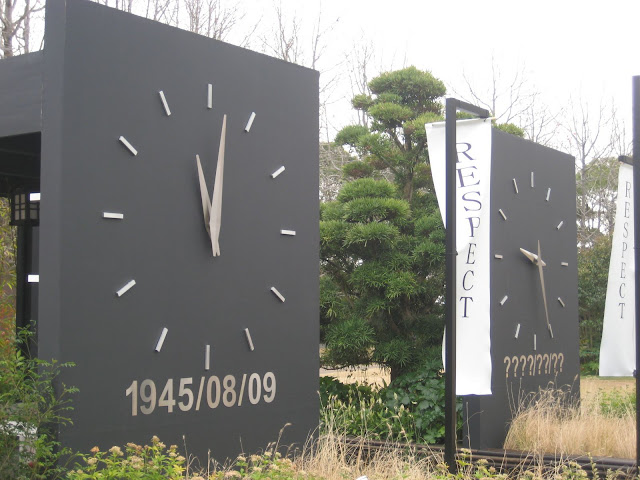
 This is the backyard of the palace, a very beautifully 'manicured' one... It also looked extremely familiar! oh! Isn't that a replica of Versaille Palace in France?
This is the backyard of the palace, a very beautifully 'manicured' one... It also looked extremely familiar! oh! Isn't that a replica of Versaille Palace in France?


Click HERE to read more about the Theme Park
The theme park was not crowded...
A ranger and the bear cycling around the theme park!
At the entrance to the palace (park) stands the monument that commemorates the atomic bombing of Nagaskaki on 9 August 1945, 11.02 am:

Click HERE to read more about the Theme Park
11 December: ChinaTown @ Nagasaki 长崎
12 December: Oura Cathedral 大浦天主堂
The Cathedral faces the Nagasaki port. It's one of the oldest cathedrals left in Nagasaki that witnessed war and the bombing of the city. It was built in the Gothic style and was designated as a National Treasure in 1933.
Beside it was a 'museum' that houses a number of items that reminded visitors of the old days when the dutch arrived and how Christianity came in to Japan.
 The 'fusion' of religion and culture was evidently illustrated in some of the religious artefacts. For instance, Guanyin carrying baby Jesus in her arms; at the back of another Buddha statue was a cross. This is amazing.
The 'fusion' of religion and culture was evidently illustrated in some of the religious artefacts. For instance, Guanyin carrying baby Jesus in her arms; at the back of another Buddha statue was a cross. This is amazing.
This is very unlike what we saw in Istanbul where the same building was converted several times, from mosque to church, from church to mosque again - illustrated through the art on the walls and ceilings of the building.
Click HERE for more information.
Beside it was a 'museum' that houses a number of items that reminded visitors of the old days when the dutch arrived and how Christianity came in to Japan.
This is very unlike what we saw in Istanbul where the same building was converted several times, from mosque to church, from church to mosque again - illustrated through the art on the walls and ceilings of the building.
Click HERE for more information.
12 December: Glover Mansion
12 December: Atomic Bomb Museum & Peace Park
Images and items from the ruins filled the exhibition area to illustrate the impact and damages of the atomic bomb. The impact was beyond words that we could describe. It's not merely taking away human lives, but from the impact saw in the pictures, it's almost total destruction of the entire piece of land! I guess, the most horrible part was the 'aftermath' killing without bloodshed through chemical radiation!
After seeing the exhibits, now I undestand what were all these gamma, beta rays all about... what were they used for (when not put into good use!) and the impact it could create instead of trying to imagine what was described in textbooks.
The guide explained that the people of Nagasaki were angry and sad, being the accidental victims as the city was not one of those shortlisted, but because due to poor visibility and the bomb hit the place. On the other hand, I think, no matter which city the bomb was dropped, it would still create the kind of huge impact we saw. That's absolute cr
 This memorial park site is about 250m away from the 'epicenter' of the bombing.
This memorial park site is about 250m away from the 'epicenter' of the bombing.
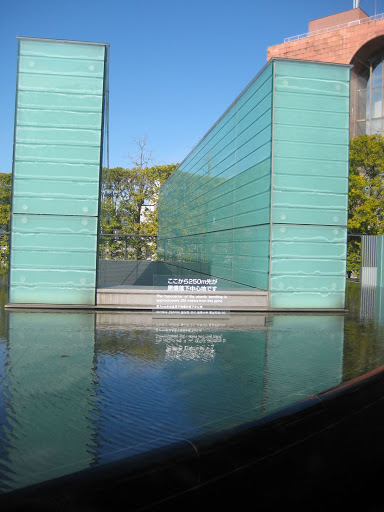 A giant statue with the left arm positioned horizontally, hand pointing outwards to symbolise peace while the finger of the right arm pointing upwards to warn for the destructive impact of the atomic bombing.
A giant statue with the left arm positioned horizontally, hand pointing outwards to symbolise peace while the finger of the right arm pointing upwards to warn for the destructive impact of the atomic bombing.
After seeing the exhibits, now I undestand what were all these gamma, beta rays all about... what were they used for (when not put into good use!) and the impact it could create instead of trying to imagine what was described in textbooks.
The guide explained that the people of Nagasaki were angry and sad, being the accidental victims as the city was not one of those shortlisted, but because due to poor visibility and the bomb hit the place. On the other hand, I think, no matter which city the bomb was dropped, it would still create the kind of huge impact we saw. That's absolute cr
Click HERE for more Information about the Atomic Bomb Museums, delicated to the Bombing of Hiroshima (广岛) and Nagasaki (长崎) in 1945.
- Nagasaki Bomb Museum
12 December: Saikai National Park - Kujuku-shima islands 九十九岛
We could see fishermen breed different kinds of sea products - shellfish to oyster! It's also a place that produce black pearls (uniquely Japan)!
13 December: Mount Aso 阿苏久住国立公园
This is an active volcano which constantly emits volcanic gas (sulphur dioxide) and ashes.
We took the 10-minute cable car ride to the mouth of the volcano.

At the mouth of the volcano... unfortunately, the morning was cold, windy and rainy and the mouth was covered by cloud and mist... we were unable to catch its majestic view!
We took the 10-minute cable car ride to the mouth of the volcano.
At the mouth of the volcano... unfortunately, the morning was cold, windy and rainy and the mouth was covered by cloud and mist... we were unable to catch its majestic view!
Video A: Driving up to Mt Aso
Video B: Leaving Mt Aso
13 December: Suizenji Joyyuen Park 水前寺成趣园
13 December: Kumamoto Castle 熊本城
Similar to the Osaka castle, it was converted into a museum where the guide brought us through the changes over time (from the shogun to the royal ruling, etc). On the other hand, Kumamoto Castle also came with another building where we visited the 'rooms' where the shogun met his subjects, the various 'layers'. Amaizing! It's represented by the number of rooms that one could go through (to get close to the leader), as well as the number of 'steps' he could move up (from the entrance). That's similar to what we saw in Nijo Castle in Kyoto.
Click HERE for more information
14 December: Sakura-jima 樱岛 (Ibusuki 指宿, Kagoshima 鹿儿岛)
Heading to board the ferry to go Sakura-jima:
This is an active volcano that 'erupts' many times within a day. We could see the emission of the fumes (ashes?) from that tiny little mouth (from far). It's not that easy to differentiate what's cloud, and what's the volcano fumes.
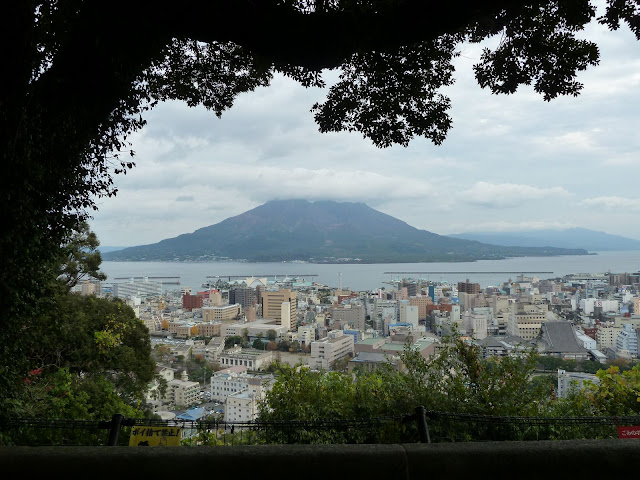
![]()

Amazing, it was an island that joined with the mainland after the eruption in 1914.
At the foot of the volcano is where people took advantage of the heated spring water for the foot bath.
 One of the viewing gallery of the mountain.
One of the viewing gallery of the mountain.

This is an active volcano that 'erupts' many times within a day. We could see the emission of the fumes (ashes?) from that tiny little mouth (from far). It's not that easy to differentiate what's cloud, and what's the volcano fumes.
Amazing, it was an island that joined with the mainland after the eruption in 1914.
At the foot of the volcano is where people took advantage of the heated spring water for the foot bath.
- Click HERE for more information
- Sakurajima Volcano Research Center
14 December: Shopping @ Tenmon-kan district 天文馆地区
Tenmon-kan district is the largest shopping district in Kagoshima. Like Beijing's Huafujing, it's rows of shopping streets filled with shops offering a variety of goods, which includes pharmacies (like Watson, Guardian equivalent), convenient stores (e.g. Daiso) and eateries and restaurants (e.g. MacDonald)


15 December: Shopping Day
It was a long journey, to return to Fukuoka.
The first stop was a Factory outlet (near Kumamoto), which was after a 4-hour drive. Tosu Premium Outlet. It's not a large shopping mall, but rows of shops, each carry its own label. Basically it's the world of winter wear. And yes, it's not difficult to find goodies that are made in China here.
By late afternoon, we arrived at the Tenjin (天神) underground shopping which is closed to our Citylink and Orchard Road area. There we found Daimaru.
The last place was Canal City Hakata which is a large shopping and entertainment complex in Fukuoka, Japan. It's also called the "city within the city".
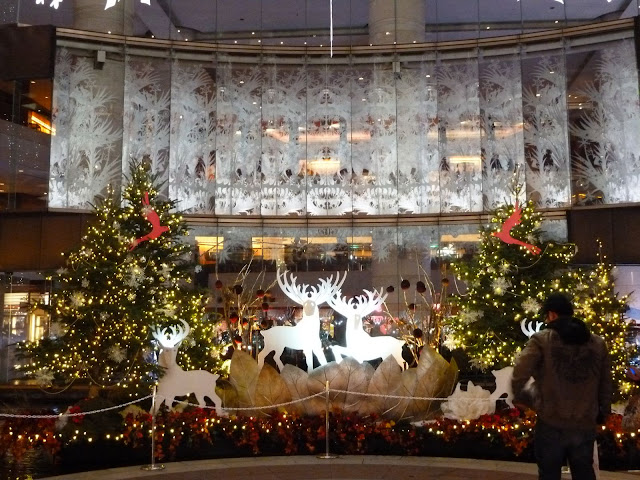
The first stop was a Factory outlet (near Kumamoto), which was after a 4-hour drive. Tosu Premium Outlet. It's not a large shopping mall, but rows of shops, each carry its own label. Basically it's the world of winter wear. And yes, it's not difficult to find goodies that are made in China here.
By late afternoon, we arrived at the Tenjin (天神) underground shopping which is closed to our Citylink and Orchard Road area. There we found Daimaru.
The last place was Canal City Hakata which is a large shopping and entertainment complex in Fukuoka, Japan. It's also called the "city within the city".
16 December: Home Sweet Home
It was rare, but I guess we count ourselves lucky that it started to snow in the morning... very light snow (blizzards) which caused a fair bit of excitement :)
Some goodies in my luggage:
This very authentic Japansese stuff are nice! Some were freshing made from the shop and packed and some were rare stuff that we won't find in Singapore (at this moment).
See the "马刺"? We didn't have the chance to try the uniquely horse sashimi there... so, got some crackers that it said came with 5% of horse meat! Haha...
Subscribe to:
Comments (Atom)




